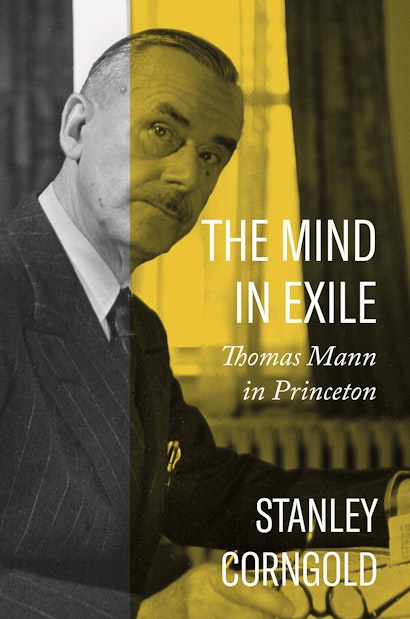In September 1938, Thomas Mann, the Nobel Prize–winning author of Death in Venice and The Magic Mountain, fled Nazi Germany for the United States. Heralded as “the greatest living man of letters,” Mann settled in Princeton, New Jersey, where, for nearly three years, he was stunningly productive as a novelist, university lecturer, and public intellectual. In The Mind in Exile, Stanley Corngold portrays in vivid detail this crucial station in Mann’s journey from arch-European conservative to liberal conservative to ardent social democrat.
On the knife-edge of an exile that would last fully fourteen years, Mann declared, “Where I am, there is Germany. I carry my German culture in me.” At Princeton, Mann nourished an authentic German culture that he furiously observed was “going to the dogs” under Hitler. Here, he wrote great chunks of his brilliant novel Lotte in Weimar (The Beloved Returns); the witty novella The Transposed Heads; and the first chapters of Joseph the Provider, which contain intimations of his beloved President Roosevelt’s economic policies. Each of Mann’s university lectures—on Goethe, Freud, Wagner—attracted nearly 1,000 auditors, among them the baseball catcher, linguist, and O.S.S. spy Moe Berg. Meanwhile, Mann had the determination to travel throughout the United States, where he delivered countless speeches in defense of democratic values.
In Princeton, Mann exercised his “stupendous capacity for work” in a circle of friends, all highly accomplished exiles, including Hermann Broch, Albert Einstein, and Erich Kahler. The Mind in Exile portrays this luminous constellation of intellectuals at an extraordinary time and place.
Stanley Corngold is professor emeritus of German and comparative literature at Princeton University. His many books include Walter Kaufmann: Philosopher, Humanist, Heretic and Lambent Traces: Franz Kafka (both Princeton).
"Corngold offers a shrewd and balanced take on a much-studied figure. This sharp, focused work will impress historians and scholars of German literature."—Publishers Weekly
"Corngold documents, in depth and with an excellent eye for detail, [an] important stage in Mann’s American life. . . . The picture of Mann that emerges from his book is rich, multilayered and always fascinating."—Costica Bradatan, Washington Post
"[The book] shows how great novelist Thomas Mann fared after fleeing Hitler’s Germany. He understood how German conservatives feared Communism, backed Hitler as a bulwark against the Bolsheviks, and learned too late that the Fuhrer’s fury was as deadly as Stalin’s."—Marvin Olasky, World
"This well-written study provides an in-depth account of Thomas Mann’s tenure at Princeton. . . . Corngold’s book is a welcome contribution."—Choice Reviews
"A vivid testimony to the profound disconcertions of a life and mind in transit and offers an immensely insightful account of the intellectual and personal quandaries that preoccupied Thomas Mann in Princeton."—Margarete Tiessen, German History
"Absorbing."—Alex Ross, The Rest is Noise
“The Mind in Exile is a remarkable achievement. Written in a vivid and wonderfully readable style, and combining personal reflections and impressions with political and literary history, this book discusses one of the most prolific periods in Thomas Mann’s American exile. Stanley Corngold introduces readers not only to a fascinating biography, but also to a broad cultural context. With a seemingly effortless yet sensitive and profound analysis, he follows the links between Mann’s literary fiction and political essays and speeches. Corngold’s intimate knowledge of Princeton’s history and spirit, and his deep familiarity with Mann’s work, revive the atmosphere of an extraordinary place and constellation, with a significance both historical and contemporary.”—Heinrich Detering, Thomas Mann Edition Project, University of Göttingen
“This meticulously researched and sympathetically drawn portrait of Thomas Mann during his three-year sojourn at Princeton offers yet more evidence of the great German novelist’s return to a place of distinction in our cultural memory. The copious political commentary that Mann produced during those dramatic years, his psychological analysis of Hitler and his astute critique of the America-first mentality, resonates powerfully with the tensions of our present moment." —Hans Rudolf Vaget, Smith College

